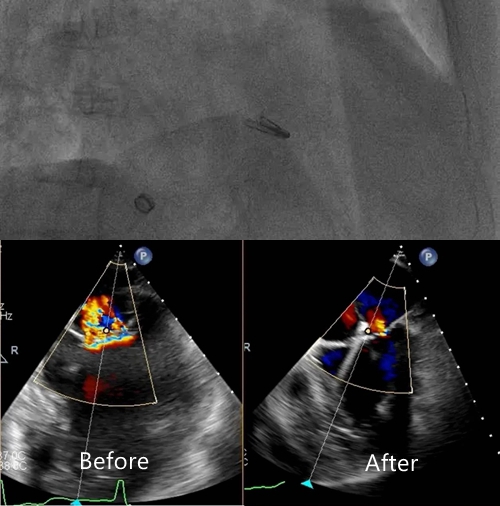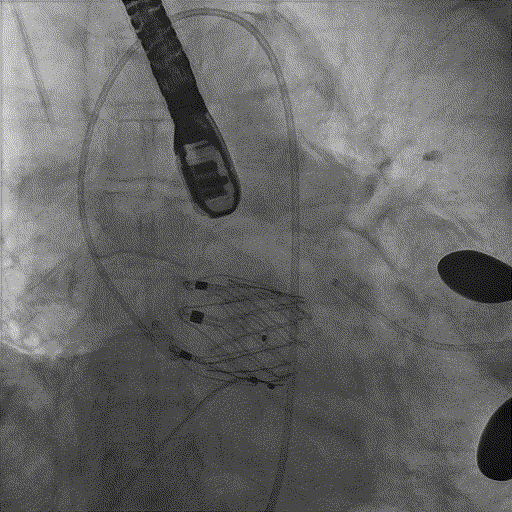
For SAHZU heart valve team, every Tuesday and Thursday are dedicated to procedures. On Tuesday, November 30 2021, another procedure day started at 7:30 am like normal and all four procedures were completed by 5pm. As routine as it is, it is a quite special day in many ways.
First of all, there are both Transcatheter Mitral Valve Repair (TMVr) and Transcatheter Aortic Valve Replacement (TAVR). In the three TAVRs, causes are both aortic valve stenosis and aortic regurgitation; Both transfemoral and transapical approaches are adopted; Both the latest inventions of valve in the world and the Chinese-developed valve are implanted; Both clinical trial and commercial use programs are involved.
It is especially worth mentioning that all four patients are at an advanced age, with an average age of 83 years, and two patients are over 90 years old.
Patient One:

Having suffered from recurrent chest tightness and shortness of breath for 8 years, the 75-year-old female patient was admitted to SAHZU after symptoms getting worse over the past week. During the past 8 years, she seldom slept on her back, and she had to sleep sitting up in the past seven days. The disease torturing this lady is called mitral valve insufficiency.
The patient family prefers minimally invasive management such as TMVr over highly risky open surgery and finally reached Prof. WANG Jian'an. Within only one hour, Prof. WANG and his team accurately clipped the site where the regurgitation is most severe around anterior and posterior leaflets with only one clip. The outcome was immediate: the regurgitation reduces to almost none. The patient got out of bed on the second day with significant improvement of her symptoms.
Patient Two:
A 92-year-old male was admitted to SAHZU due to recurrent chest tightness, shortness of breath, and lower extremity edema. Besides severe aortic valve stenosis, failing heart function and a medical history of cardiac pacemaker implantation, the patient also had comorbidities such as liver cirrhosis and renal insufficiency.
As his family said, "In the past, there would be nothing for us to do but watch him go." However, they are lucky. With an operation that lasted for only about 30 minutes, Evolut PRO, the most advanced aortic valve in the world, was implanted into the patient (see below picture). Since there is no need for tracheal intubation during general anesthesia, the patient returned to fully-conscious at the moment when the procedure ended.
Despite his advanced age, the patient was able to walk 4-6 hours after this almost noninvasive procedure (see below picture). He was discharged from the hospital the following day with his family and himself marveling at the magic of the interventional technique and the speed of his recovery.
Patient Three:
This 91-year-old patient was caught between life and death when arriving at SAHZH. Following an acute left-sided heart failure, he experienced difficulty lying down and had comorbidity such as chronic obstructive pulmonary disease. His liver enzymes level almost reached 2000, tens of times higher than the normal range.
The patient got better after an active treatment and the echocardiography indicates that the cause was severe aortic valve insufficiency. After a comprehensive preoperative evaluation, SAHZU heart valve team decided to adopt a nearly non-invasive transfemoral approach to replace the patient's aortic valve. In less than 30 minutes, the valve was placed steadily and functioning normally with almost no regurgitation (see below picture).
This patient returned to the ward with much more relieved symptoms and was able to do some simple exercises the next day after the procedure (see below picture).
Patient Four:
A 75-year-old female patient was admitted into SAHZU intensive care unit after tracheal intubation due to an acute heart failure one month ago. During the treatment, it was determined that the cause of her heart failure was severe aortic valve insufficiency. Apart from her poor heart function, the patient has a past medical history of hypertension and diabetes, leading to a higher risk of thoracotomy. The imaging experts of the heart valve team suggested a TAVR with transapical access for her, as the procedure would not require an extracorporeal circulation and cardiac arrest, and the incision could be only one third of the size of a thoracotomy. The second day after the procedure, the patient was extubated and transferred out of the intensive care unit.
Before the procedure:  After the procedure:
After the procedure: 
Recent years have seen a quickly surging incidence rate of valvular diseases with the aging of population. For patients with severe aortic valve stenosis, aortic valve insufficiency, and mitral valve insufficiency, without timely interventions, their survival period could be shorter than that of cancer patients. TMVr and TAVR offer new treatment options and bring hope to elder patients with multiple comorbidities and weak health.
SAHZU is a leading provider of transcatheter heart valve interventions in China. The heart valve team has proctored more than 100 domestic medical centers and 7 medical centers in Asia, Europe and South America. It promotes enhanced recovery after surgery and early discharge. More than 50% of TAVR patients can start walking 4 hours postoperatively and be discharged on the second day. More than 80% of TMVr patients can be discharged 3 days after the procedure.
Author:CHEN LU | Reviewer:LI JING | Editor:LI JING | Source:SAHZU OFFICAL WECHAT | Date:2021-12-06 | Views:![]()
![]()